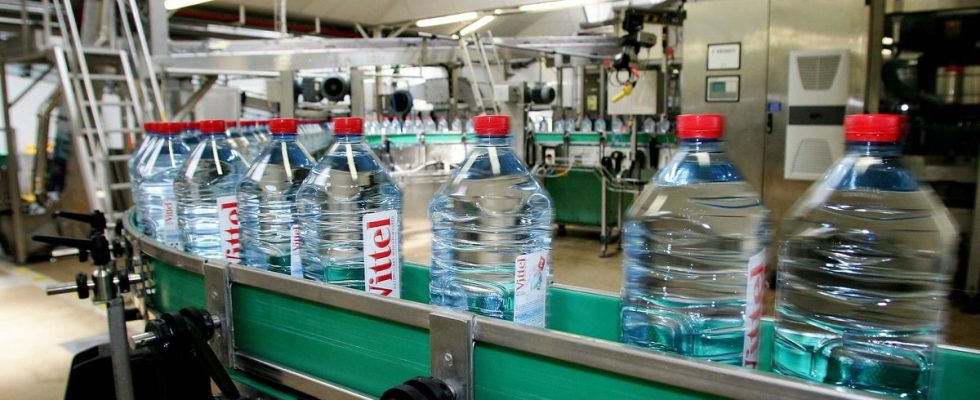Officially, it’s obvious: natural mineral waters are not treated unlike tap water. But a joint investigation by World and of Radio France, published this Tuesday, shows that few bottlers respect the law. For Nestlé Waters, it’s flawless. Vittel, Perrier, Contrex, Hépar, St-Yorre… All of the group’s water brands would be affected. According to a report from the General Inspectorate of Social Affairs (Igas), submitted in July 2022 to the government and kept secret until now, a third of French mineral water brands undergo non-compliant treatment. Worse still, the document adds: “The mission has no doubt about the fact […] that all ore carriers are concerned. »
Nestlé Waters tried to limit the damage by admitting on Monday, on the eve of the release of the articles, that it had indeed used prohibited treatments on its mineral waters. But will this crisis communication be enough to put out the fire? “Every time a scandal of this type breaks out like with Kinder or Buittoni, sales fall,” warns Pascale Hebel, an economist specializing in consumer behavior. Unlike Buittoni, however, whose pizzas were accused of having caused the deaths of two children, “here, it is not dramatic in terms of health: consumers will only understand that they are drinking water similar to that of the tap but much more expensive,” she explains.
It’s all “a question of trust”
In fact, Perrier, priced at 3.90 euros per liter at Carrefour, is almost a thousand times more expensive than tap water which is priced at 0.004 euros per liter in Paris. “During the Volkswagen scandal, people didn’t feel personally affected because they didn’t expect the brand to produce green cars. There, however, it is different. It’s a question of trust,” underlines Géraldine Michel, professor at IAE Paris Sorbonne and director of the Brands & Values research chair. By purchasing bottles of mineral water, consumers hope to consume natural (untreated) and healthier water.
The world number one water seller has therefore broken the contract of trust. However, the brand enjoys a reputation for “quality and trust”, notes Géraldine Michel. However, “the more powerful the brand, the shorter the crisis”, simplifies Pascale Hebel. Once the storm has passed, the bottles of Vittel bought at the supermarket and the lemon Perriers tasted at the bar will not go bad. And since all Nestlé Waters products are affected, it is expected that many people “will not make the link with the commercial brands in supermarkets, which will further protect the products [comme Vittel ou Hépar] of the boycott,” underlines Géraldine Michel.
“Questioning the economic model”
The world number one water seller could therefore quickly swallow the controversy, if the legal and institutional fallout remains discreet. The public prosecutor, Eric Neveu, assured the World that he would soon decide on the criminal direction of a case described as “complex and very technical”. But if new investigations confirm chronic pollution at Nestlé Waters sites, the company could have to close them or downgrade its water by marketing it under the name “water made drinkable by treatment”.
The market is buoyant in France: the most popular product purchased from the country is the Cristalline water pack, water precisely “made drinkable by treatment”. But “from a financial point of view, it could call into question the economic model [de Nestlé Waters] because the margins are not at all the same,” warns Géraldine Michel. The pack of six 1.5 liter bottles costs 1.12 euros at Leclerc for Cristalline, acclaimed by the French, against 2.94 euros for Vittel.
Well-integrated “representations”
“Between inflation and the ecological image, consumption of bottled water is tending to decline,” notes Pascale Hebel. Discovering that bottled mineral water does not come from pristine glaciers and pure springs, but has been decontaminated by activated carbon or ultraviolet light, consumers may slowly turn to running water.
Plastic particles, ecological cost, price… If mineral water and tap water are as similar as two drops of water, the advantage seems to go to the second. Especially since, although many consumers favor the first, convinced that it is purer, it is nevertheless less regulated by European legislation. In running water, 65 chemical substances and heavy metals are capped compared to only 16 for bottled water. But “for decades, people have been told that bottled mineral water is better for your health, it is extremely integrated. Even with a scandal, it takes years to change such representations,” warns Géraldine Michel. It is therefore difficult to imagine a tsunami in the mineral water sector.

